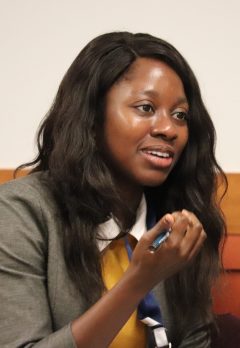
Dr. Mercy Asiedu writes about her experience during the Cambridge Global Meeting and her takes on growth in learning.
I guess it is of no surprise that switching fields from biomedical engineering with a focus on devices and global health, to computer science in one of the top machine learning labs at MIT, with Schmidt Science Fellows, has its challenges. I had to learn new programming languages, learn how computer scientists think, and how they work, which is very different to what I am used to.
Over the first few months, as I tried to figure out what ssh, tmux and mosh meant, and was learning how to tune hyperparameters, and create data dictionaries, I found myself asking if this was the right decision. I would definitely have been more comfortable continuing on in my field, where resource-limited settings, means limited access to basic human health needs, instead of limited access to data for machine learning, but then, where would the growth be? As the saying goes: “Growth starts at the end of your comfort zone.”
Time is flying as I have already completed four months of my fellowship and learned so much. My comfort in using linux/unix systems and coding in python keeps growing and my understanding of deep learning techniques is increasing. Being at MIT, surrounded by the intellectual creative buzz of Kendall square, the most innovative square mile on the planet, energizes me each day with feelings of endless possibilities. Whether it is working on my postdoctoral research work, participating in my MIT Catalyst Health Innovation Fellowship, taking free classes on CRISPR just for fun, applying to entrepreneurship competitions or meeting and talking with innovators, I am constantly filled with hope and excitement for the future.
Reflecting back on our Global Meeting series at Cambridge, MA, hosted by MIT, Harvard and the Broad Institute, my mind flashes back to the motto at my elementary school, written on a wooden plaque which hung above the chalkboard in class 7K of KNUST JSS in Kumasi, Ghana. Inscribed on it was the equation:
Desire + determination + discipline = Success
During times when I feel challenged in my new field, I remind myself of this motto, and of what my passions are, what compels me to work in this area, and my overall goal to apply innovation to health disparities.
This theme is something I saw repeated over and over again during our Global Meeting in Cambridge. Two particular talks on non-traditional paths, fueled by passion, and resulting in astounding success particularly stuck with me. The first, Professor Robert Langer, a world-renowned biomedical researcher and entrepreneur who was rejected from several hospitals and teaching institutions he wanted to work at because he “did not fit the mold” as a chemical engineer who wanted to go into teaching or healthcare. Despite this, he was persistent and followed his passion to help people as he believed in himself and his ideas. Currently, as a biomedical engineer at MIT’s Koch Institute, he holds over 1000 patents in biomedical technology and has spun-out 40 companies.
The second is Eric Lander, the president and founding director of the Broad Institute – during his postdoc he was concerned that no one was ever going to want to hire him because he had such a broad range of research experiences. Now, Eric is famed for his ability to understand and interpret jargon from completely different disciplines. As he reflected on his journey, he told us: “Follow your passions where that may lead you… “In the end they may not want a lot of you, but they will definitely want at least one of you.” As Eric Lander put it, being passionate about something naturally results in determination to work towards and overcome associated challenges, which brings about discipline. This is what drives me and what continues to keep me going during my Postdoc. My passions lie in learning cutting edge technologies to bridge disparities in healthcare, and at this moment I think artificial intelligence is that cutting-edge technology and I am determined to spend this year acquiring new skills in this area. From listening to the pacesetters, who transcended academic boundaries and norms, I know that challenges are to be expected but with desire, determination and discipline, success is not far behind.
Here are a few items I learned from the Global Meeting on growth in learning:
- Follow your heart and your interests.
- Do not focus on how difficult a task is, but have an appreciation for the work you put into it.
- Deeply believing in something and being committed to it increases the probability of success.
- Lucky accidents – Yes, luck can be associated with success but try to put yourself in places and situations where you are more likely to get lucky (MIT is definitely one of those places).
- Know that there will be disproportionate amounts of failure – have a support network to help you through.
- Work with good, generous people who are willing to advocate for you.
- There are many lenses to view the world through and it is better to view the world through more than way.